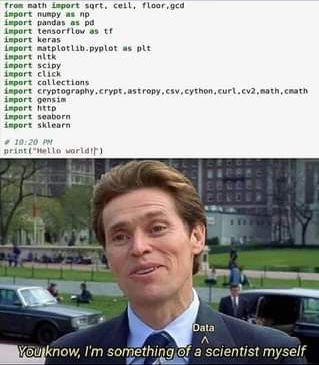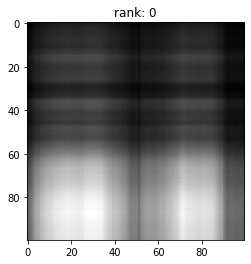Machine Learning - Foundations
Orientation
An Interactive Session
Faculty



Prof. Harish Guruprasad
Prof. Arun Rajkumar
Prof. Prashanth LA
Machine learning,
statistical learning theory and
optimisation.
Machine learning,
statistical learning theory with applications to education and healthcare
Reinforcement learning, simulation optimization and
multi-armed bandits
Instructors





Anamika
Abhinandan
Arun
Amrutha
Jimmi
Vishal

Do you want to understand how Machine Learning algorithms work?

So

use Machine Learning algorithms
Almost all products from
Do you Know?


use Machine Learning algorithms
Almost all products from
Do you Know?
Not only that, do you want to become an expert in Machine Learning?


Sounds Great, Let's Start with

Linear Algebra
Calculus
Probability and Statistics

What?.. No..No..
Optimisation
Nowadays, many of you might think

import numpy as np
import tensorflow as tf
import keras
import torch.nn as nn
import nltk
import sklearn
import pandas as pdThis is just a part not the whole of data science or ML!
Linear Algebra, Calculus, Optimisation
Probability
&
Statistics


Applications

Hmm ...
Thinking of,
where it is not applied..
Engineering?
Particle Physics?
Chemistry?
Molecular Biology?
Astronomy?
Law?
Education?
Hard to find!
Pre-Requisites
-
Linear Algebra
-
Calculus
-
Probability

Introductory level in
-
Python Programming
We review and help you understand all the required concepts.
Your interest, involvement and perseverance matters more than anything!

What will I learn in MLF?

1
Introduction to
Machine Learning




Perception

Very Easy

What will I learn in MLF?

2
Calculus

\(\frac{d y(x_0)}{dx}\)

Perception

Easy

What will I learn in MLF?

3
Linear Algebra:
Least Square Regression
Perception

Moderate

What will I learn in MLF?

4
Linear Algebra:
Eigenvalues & Eigenvectors


Moderate

Perception
What will I learn in MLF?

5
Linear Algebra:
Complex Matrices and SVD


Difficult

Perception
What will I learn in MLF?

6
Linear Algebra:
PCA and its applications


Difficult

Perception
What will I learn in MLF?

7
Optimisation:
Unconstrained


Easy

Perception
What will I learn in MLF?

8
Optimisation:
Convex sets,functions


Moderate

Perception
What will I learn in MLF?

9
Optimisation:
Constrained and Lagrange multipliers


Moderate

Perception
What will I learn in MLF?

10
Probabilistic Models in Machine Learning


Very Easy

Perception
What will I learn in MLF?

11
Exponential Family of
Distributions


Moderate

Perception
What will I learn in MLF?

12
Parameter estimation
Expectation Maximization


Difficult

Perception
What is the Grading Policy?


Two Quizzes (50%)



Final Exam (50%)
Types of Questions:
1. MCQ
2. MSQ
3. NAT
How much effort do I need to put into per week?

3 Hours for
watching


Live sessions

Activity, Practice, Test
"Any unwillingness to learn mathematics today can greatly restrict your possibilities (opportunities) tomorrow."
-Richard Hamming
Hoping to see you all soon

Feel free to ask any questions.
Image Credits:
https://flaticon.com
https://www.flaticon.com/authors/photo3idea-studio
https://www.freepik.com
https://www.flaticon.com/authors/smashicons
https://giphy.com
https://www.flaticon.com/authors/srip
https://www.flaticon.com/authors/flat-icons
https://www.flaticon.com/Nikita Golubev
https://mathworks.com
https://scikit-learn.org/stable/auto_examples/applications/plot_face_recognition.html
https://forbes.com
Machine Learning Techniques
&
Machine Learning Practices
Orientation
An Interactive Session
Faculty
Ashish (Vijay) Tendulkar
Machine Learning Specialist (Google)
Machine learning,
and Deep learning with applications to Natural Language Processing

Instructors





Anamika
Abhinandan
Arun
Amrutha
Jimmi
Swarnim


Debajyoti

Nitin
Instructors




Anamika
Arun
Amrutha
Karthik
Swarnim


Debajyoti

Nitin
Jimmi

ML Techniques
Regression
Classification
Clustering

1
An Introduction

ML Techniques
Regression
-
Linear
-
Polynomial
-
Regularization

2-3



ML Techniques
Classification
-
Least Square
-
Perceptron
-
Naive Bayes

4-6

Sepal
Petal
ML Techniques
Classification
-
KNN
-
Linear SVM
-
NonLinear SVM

7-8

Sepal
Petal
ML Techniques
Classification
-
Decision Tree
-
Bagging
-
Boosting

9-10

Sepal
Petal

ML Techniques
Clustering

-
K-Means
-
HCA

11
ML Techniques
Classification
-
Neural Networks
- Back Propagation

12

Sepal
Petal


Does this course have any programming Components?



def loss(X, w, y):
y_hat = predict(X, w)
samp_loss = np.maximum(-1*y_hat*y, np.zeros(y.shape[0])))
J = np.sum(samp_loss)
return J

What is the Grading Policy?


Two Quizzes


Final Exam
Types of Questions:
1. MCQ
2. MSQ
3. NAT
4.Programming


Two Proctored Programming Exam


Machine Learning Practice
MLF
MLT
MLP



Make a hot & sweet drink:
How do you select the required ingredients? How do you mix? Does order of mixing matter? How do you assess the quality? ...
All about ingredients.
Essential and inevitable!
Everything is trivial in cook books
Reading a cook book

Our Kitchen

from sklearn import datasets
from sklearn import pipeline
from sklearn import linear_model
from sklearn import metrics
